UNESCO AND THE ISSUE OF CULTURAL DIVERSITY Review ... - ITI
UNESCO AND THE ISSUE OF CULTURAL DIVERSITY Review ... - ITI
UNESCO AND THE ISSUE OF CULTURAL DIVERSITY Review ... - ITI
You also want an ePaper? Increase the reach of your titles
YUMPU automatically turns print PDFs into web optimized ePapers that Google loves.
equest had yet been made for this service): ‘the programme for 1952 for the<br />
first time includes a resolution authorizing me “at the request of the Economie<br />
and Social Council of the United Nations, and with the approval of the Executive<br />
Board, to assist, by means of studies, enquiries or advice of experts in the<br />
social sciences, the action of the United Nations, either to maintain peace in<br />
areas where conflicts are liable to arise, or, after the cessation of hostilities, to<br />
restore the normal life of national communities in areas subject to conflicts” ’ (p.<br />
198). This is precisely the kind of action that could be extremely used on the<br />
contemporary world stage, if carefully planned and coordinated with the UN and<br />
other international bodies. <strong>UNESCO</strong> has corne a long way in the post half-<br />
Century but, despite certain changes, the continuity in its mandate and mission<br />
is also unmistakable. Intercultural relations are, indeed, an international security<br />
issue. As <strong>UNESCO</strong>’s history has demonstrated, the need to study and to handle<br />
situations of cultural pluralism on every societal level Will remain a vital and<br />
indispensable focus for the Organization’s activities. This attention to cultural<br />
pluralism Will ensure that <strong>UNESCO</strong> remains proactive and relevant in the most<br />
pressing areas of international relations today.<br />
While taking note of this continuity, it is also necessary to acknowledge<br />
that new challenges have arisen during these last years in relation to the<br />
extension of the globalization process. This movement brings both<br />
unprecedented potentialities of expression and innovation, and the risk of<br />
marginalization of the most vulnerable cultures. Taking advantage of the new<br />
possibilities being offered by globalization and regulating it are vital actions SO<br />
that all cultures may achieve full recognition, without undergoing exclusion in an<br />
emergent global economy.<br />
In this perspective, <strong>UNESCO</strong> highlights the necessity to protect tangible<br />
and intangible heritage in its plural aspects, as well as the diversity of<br />
contemporary intellectual and artistic creation. Cultural goods indeed are not<br />
mere consumer goods; they express a vision of the world and the most<br />
complete identity of individuals and peoples. Particular attention is paid,<br />
therefore, to the commercial exploitation of cultural goods which are also<br />
symbols of identity. This means taking copyright into consideration and<br />
remaining vigilant as the respect of intellectual property and the constitution of<br />
new global markets. It is equally important, in the view of <strong>UNESCO</strong>, that the<br />
development of new technologies should not weaken cultural diversity. In this<br />
regard, <strong>UNESCO</strong> insists on the need to promote pluralism of media, linguistic<br />
diversity and the presence of local contents in the cyberspace. By including the<br />
new economic and technological dimension induced by globalization in the<br />
definition of its strategy, <strong>UNESCO</strong> is involved in promoting cultural diversity,<br />
when it faces new challenges without supporting cultural relativism or<br />
fundamentalism.<br />
Where is <strong>UNESCO</strong> now ?<br />
After two Round Tables of Ministers of Culture, one on “Culture and<br />
Creativity in a Globalized World” (<strong>UNESCO</strong>, Paris, 2 November 1999) and the<br />
other one on “Cultural Diversity: 2000-2010: challenges of the marketplace”<br />
(<strong>UNESCO</strong>, Paris, 11-12 December 2000), an Expert Committee on “the<br />
Strenthening of <strong>UNESCO</strong>’s Role in the Promotion of Cultural Diversity in the<br />
Context of Globalization” (Paris, 21-22 September 2000) and intensive debates<br />
19



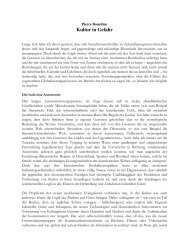
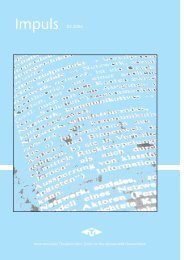
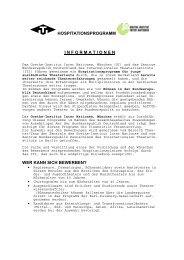
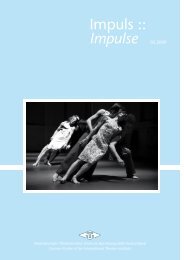
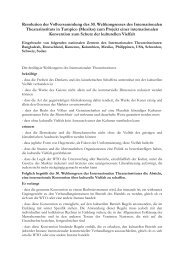
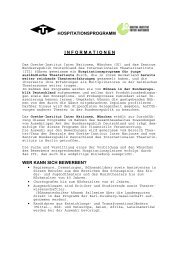
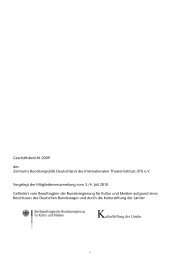
![Geschäftsbericht 2010 [pdf 2 MB] - ITI](https://img.yumpu.com/4380475/1/184x260/geschaftsbericht-2010-pdf-2-mb-iti.jpg?quality=85)